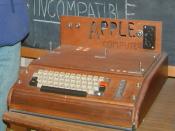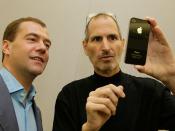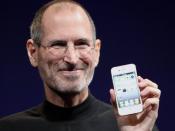Problem
Is their company model sustainable without Jobs
Can Apple continue to be a successful company
Cook's new strategy is different than Jobs's. Will the difference contribute to continued success or make it fail?
Focus on products and competition
Innovation on new products, design, development
DIFFERENTIATION
External analysis
Apple has products in several different markets. Most notable are desktop computers, laptops, tablets, smartphones, and MP3 players. While all of these are in technology hardware, they all have slightly different nuances in the market.
The power of suppliers
Because most of the supplies in building their products are relatively simply to replicate and to make anywhere, the power of suppliers is relatively low across the board. There is however one major exception, which is Intel. Without the Intel microprocessor, most if not all of Apple's products become obsolete and unable to communicate effectively with other types of computing systems, which would remove the digital hub possibility.
Even here though, because of Apple's large number of products and customers it would be unwise for Intel to give up any contract with Apple.
The power of buyers
The cost of switching whether it is a desktop computer or a smartphone is fairly low. However, low cost is not the focus of Apple and few if any of its competitors have been able to differentiate themselves effectively, so for the consumer more interested in reputation, there is little else in the market to fulfill their technology needs and wants.
Rivalry
The strongest rival with Apple is Microsoft and on that it really is a focus on computers, laptops, and tablets. In the smartphone section of the market, there are the various types of Android options, however no other company has been able to compete strongly within the MP3 market.
The threat of entrants
The physical and digital aspects of most of Apple's products are not terribly difficult to build, which is why Jobs spent so much time and effort keeping it's intellectual property its own. Other than that the only real threat to new entrants is getting their system into stores and onto networks, which can be overcome.
The threat of substitutes
With computers, laptops, and tablets, they can sometimes be considered substitutes with each other, but most consumers will stick with the two major operating systems. There are a couple of other options such as the Google operating system or the openware Linux operating system, but generally substitution is low. For smartphones, there is always the option to go to more classic cellphone. MP3 players have several substitute options from radio to CD players.
Problem statement -everyone
Diagnosis- Haval
Internal analysis - Haval
External analysis- Christina
Alternatives- everyone
Recommendation- Weihua
Implementation- Jyoti
Financials- Weihua
Putting things together- Christina
Risk and contingency plan -????
Apple's challenges:
Apple Inc. is one of the few companies that their success were closely identified with its CEO. By dying Apple's legend CEO, Steve Jobs, on October 5th 2011, Apple Inc. face a big challenge, sustaining Apple's current position in the technological market.
Direct Competition: Compaction is very strong in technological market and the market shift over time.
PC Manufactures: 53.6 % of the PC market was dominated by four PC manufactures; HP, Dell, Lenovo, and Acer. Although these companies did not have a stable market share but each of them has some core competencies. For example, the fastest growing PC market, China, dominated by Lenovo
Apple's beigest competitor in operating system, Microsoft, dominates more 90% of computer market. Also, it was set to introduce windows 8, which may challenge Apple in the user interface.
I tunes, which is one of the Apple's biggest innovations is challenged by online music stores such as Amazon, Napster and Walmart.com. They over songs at a competitive price to I tunes. In addition, some internet radio sites such as Pandora over free streaming music.
Apple also faces a big completion in the phone industry. Some of apple competitors over a better phone experience by providing larger and brighter screen, better camera and Audio improvement.
Remaining as leading innovator in the technological sector: Apple was one of the top innovative companies from the time Steve Jobs took the CEO place until his resignation. During that period apple could improve Macintosh PC by providing new OS, shifting to new chips "Intel chips", providing more applications and realizing Apple store. Also, Apple interned new markets such as digital music and song and smart phone production. Steve Jobs said instead of giving customers what they want " our job is to figure out what they are going to want before they do"
Internal Analysis:
Apple is a fast growing company with big potential. It has been able to successfully enter many different markets and create a sustainability for its products. For example, Apple launched iPod in 200, iPhone in 2007 and iPad in 2010. Also, Apple started providing music and eBooks through iTunes store and Apple book store.
Talented Employees: Even Jobs was the man who revolutionize the company but he was not working alone. There are many talented employees that contributed to the unique culture behind Apple success such as Tim Cook, Jonathan Ive, and many others. Even after the death of Jobs, except a small group of the employees who left the company, the rest of staff are still contributing to keep Apple as leading technological company.
High Profit Margins: The most important goal of any company is to make money. It is determine the company's ability to satisfy shareholders and company's management efficiency. Also, it empowers the company to invest more in R&D and attract highly talented people. Apple and its competitor's financial data shows that Apple had the second highest net income on 2009 and 2010 after Microsoft and it had the first highest income in 2011.
Apple and its competitors' Net Income, 2004 - 2011 (In millions of dollars)
Companies | 2004 | 2006 | 2008 | 2009 | 2010 | 2011 |
Apple | 266.00 | 1,989.00 | 6,119.00 | 14,013.00 | 25,922.00 | |
Microsoft | 8,168.00 | 12,599.00 | 17,681.00 | 14,569.00 | 18,760.00 | 23,150.00 |
Intel | 7,516.00 | 5,044.00 | 5,292.00 | 4,369.00 | 11,464.00 | 12,942.00 |
HP | 3,497.00 | 6,198.00 | 8,332.00 | 7,660.00 | 8,761.00 | 7,074.00 |
Dell | 3,018.00 | 2,583.00 | 2,478.00 | 1,433.00 | 2,635.00 | 3,492.00 |
Nokia | 3,952.00 | 5,331.00 | 4,937.00 | 1,103.00 | 2,290.00 | (1,441.00) |
Samsung | 9,148.00 | 6,720.00 | 4,685.00 | 8,116.00 | 13,396.00 | 11,327.00 |
Brand and Reputation: Even after Tim Cook took the CEO position, Apple had performed significantly above expectations. Apple market capitalization surpassed $600 billion in 2012, making it the most valuable company in the history of world.
Culture of Innovation: Apple believe deeply on focus and had one of the narrowest product lines comparing by its size. It invests heavily on research and development. For example, it devoted 9% of sales to research and development compared with 5% at Compaq and only 1% of IBM-clone manufacturers. Also, the company believes high confidentiality. Even Apple's employees do not have access for all areas of the company. Confidentiality and protecting intellectual property is important especially in the technological market, where incentive competition leads to numerous lawsuits on design and intellectual property.
Environmentally Friendly: Apple computers are the world greenest lineup of notebook. They are energy efficient and used recyclable materials.
Apple VRIO framework
Resource | Value | Rarity | Imitability | Organization | Competitive implication |
Products' sustainability | Yes | No | Competitive parity | ||
Talented Employees | Yes | No | Competitive parity | ||
High Profit Margins | Yes | Yes | No | Temporary competitive advantage | |
Brand and Reputation | Yes | Yes | Yes | Yes | Sustained competitive advantage |
Culture of Innovation | Yes | Yes | No | Temporary competitive advantage | |
Environmentally Friendly | Yes | No | Competitive parity |
Possible Alternatives
Alternative -1: Do nothing strategy/Have faith in the capabilities and work style of your new CEO
Alternative-2: Be more aggressive, Current management should invest more in R&D of new innovative products and also be very protective about protection of Intellectual properties, There should be only one Apple in the market.
Alternative- 3 : Change the management and find someone of similar caliber as Steve Jobs
Recommendation
Alternative-2: Be more aggressive, Current management should Invest more in R&D of new innovative products and also be very protective about protection of Intellectual property, There should be only one Apple in the market
Pros-
Market positioning- Apple has positioned itself as the innovative and premium brand computer and it should certainly maintain and build up on this, and it cannot be possible by going lenient about intellectual property protection.
Protection of Intellectual Property is crucial for Apple- According to the former CEO Jobs - Company thrived when it created intellectual property and if protection of these properties began to disappear innovation in business will be disappeared.
Implementation Plan
Tim Cook is a talented individual, has long work experience with Apple and given his past track record, he is very likely to prove himself as the most suitable leader for this technological giant. Apple's board has demonstrated confidence in his abilities and company has surpassed $600 billion market capitalization under his initial leadership. However his leadership style is a little different then Jobs and to maintain Apple's strategic position in the market we would advise him to take below mentioned plan in consideration.
Short Term-
Protect Intellectual properties- In short term we strongly recommend Apple should adopt very aggressive approach about protecting its intellectual property and patents filing. It's crucial for the company to maintain its competitive advantage.
Maintain and promote Culture of Confidentiality- Apple's core success is credited to its former CEO Steve Jobs, Jobs firmly believed in practicing secrecy. Apple created a culture of confidentiality which also included a close door policy. We strongly suggest Apple to keep up with the culture of confidentiality.
Watch the competition- Competition is getting very intense, android based tablets and smart phones are flooding the market and the most appropriate strategy for Apple to deal with this competition is to keep differentiating itself by providing innovative products, ease of use and technological excellence.
Long term
Invest heavily in R&D- Apple has drastically reduced its investment in R&D, according to Exhibit 1a- Apple's investment in R&D was about 8% (% of sales) in 2002 which was gradually reduced to only 2% (% of sales) in year 2012; this 2% investment in R&D is about similar to its competitors. However in times when Apple is trying to protect its legacy it should think far ahead of the competition and should invest heavily in innovating smart and next gen products before competitors can even think about those. We would recommend Apple to take the R&D Investment level back to 6-8% within 2-4 years period.
Introduce New Products- What is next? Apple has introduced multiple successful products such as i-pods i-pads, and i-phones which changed the game completely. Every few months apple is coming up with new versions of i-phone but we think this is not enough. It is high time for Apple to come up with a totally revolutionized product and maintain its legacy of innovation.
Financial Analysis Part
Graph of return on assets shows that Apple has been using its assets effectively and efficiently to generate revenue and profit since the success of iPhone in 2007. The trade of stock price and market value both showed that Apple has been enjoying steady growth in value since 2007.
PC Worldwide Market Share in 2011
HP | Dell | Lenovo | Acer | Apple | Other |
17.7% | 12.6% | 12.5% | 10.6% | 4.7% | 24.2% |
The four top PC vendors-Hewlett-packard, Dell, Lenovo, and Acer-accounted for 53.4% of worldwide shipments in 2011. HP held on to the No.1 position thanks to its strategies of lowering its costs by outsourcing. Dell took the second largest market share with its combination of direct sales and build-to-order. Lenovo and Acer are growing fast in both American and Asian market. Even though Apple's PC market share was only 4.7%, the overall gross margin was 41%, compared to Dell's 22% and Hewlett-Packard's 23%, which gives Apple competitiveness.
The graph of worldwide smartphone market share shows that smartphones with IOS and Android grew dramatically in recent years. Android smartphones held a leading market share of 46.4% compared to IOS smartphone of 18.9% in 2011. Since IPhone accounted for 44% of Apple's total revenue, Apple should focus on IPhone products to increase its market share in the U.S. market. Apple needs to address the problems such as slow running on the 4G LTE networks, its limited battery life, as well as its lack of support for Adobe Flash, which made some websites unusable for iPhone users. Meanwhile, Apple should expand aggressively in rising market such as China and India, where 3G and 4G networks are developing fast.
The graph of worldwide tablet shipments by operating system shows a continuous decline of the market share of tablets which use IOS operating system. On the contrary, the past three years saw a stable growth of the market share of tablets using Android system. At present, Apple is enjoying an estimated 25% gross margin on iPad compared to a 15% gross margin earned by most competitors. But if the market share keeps declining, Apple's revenue will be threatened. Apple need to figure out how to compete with at least three potential competitors for tablets, which are manufacturers using Google's version of Android; Amazon, which used an open source version of Android; and Microsoft-based tablets which use Windows 8.
R&D/Sales
2006 | 2008 | 2009 | 2010 | 2011 | |
Apple | 4% | 3% | 3% | 3% | 2% |
Microsoft | 14.9% | 13.5% | 15.4% | 13.9% | 12.9% |
Intel | 16.6% | 15.2% | 16.1% | 15.1% | 15.5% |
Nokia | 9.5% | 11.7% | 14.3% | 13.8% | 14.4% |
Samsung | NA | NA | 5.4% | 5.9% | 6.0% |
Compared to its competitors, Apple's investment in R&D is low. If Apple wants to focus on innovative products, and maintain its leading position, it should invest more in R&D. Plus, since 1998, there has been no cash dividends paid. Apple can finance the increased R&D investment with cash from net income.


